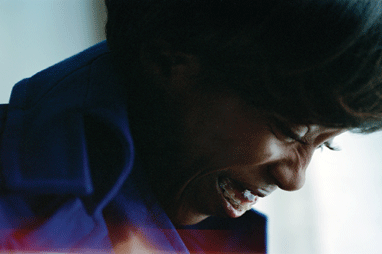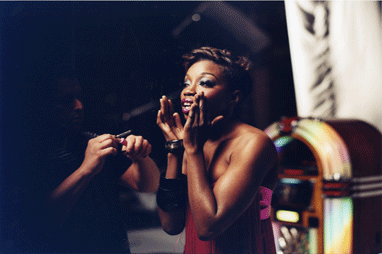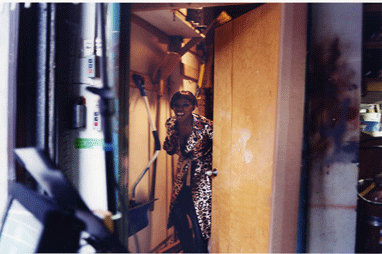Estelle's "American Boy" has already assumed its position in nearly everyone's barbecue rotation, and now the followup singles from Shine are simmering as well. Not to say we told you so, but read T Cole Rachel's feature from our current Summer Music issue on the Girl of the Summer (don't accept any substitutes) after the jump.
Story T. Cole Rachel
Photography Dorothy Hong
The first time I see Estelle in person, she looks like a superhero. I am standing awkwardly outside her dressing room at a video shoot in New York City in late April, waiting for someone to tell me where I should be. Even though I can’t actually see through the small army of stylists, assistants, managers and publicists crowded around the doorway, laughing and applauding, it’s clear this tiny room is the epicenter of some huge production. Somewhere from behind the door, I hear a distinctly British-sounding voice asking, “Are you sure? You sure this will stay on? I don’t want them to come shooting out!” A few minutes later, the crowd parts and Estelle emerges—smiling wide, she’s all long legs, impossibly huge eyes, glistening lips and, I’m fairly certain, wearing a cape. “Are they ready for me?” she asks, and before anyone can answer, she trots down the hallway and out onto the perfectly illuminated soundstage.
Two days later she will drop Shine, her major label debut, in America. Released in the UK last March, the record has already yielded a couple of huge singles abroad: the chart-topping “American Boy” featuring Kanye West, a breezy ode to romantic tourism, in which a girl from London town explores the mysteries of American men; and the will.i.am-produced “Wait A Minute (Just a Touch),” a marriage of jitterbugging beats and a vocal hook that sounds like it could have floated off a long-lost disco album and landed in the middle of this R&B come-on. Both songs have generated a considerable amount of heat stateside. Given the recent US fascination with British pop and soul singers like Amy Winehouse, Duffy and Adele, the time seems right for an artist like Estelle—a charismatic rapper/singer who channels a hybrid of classic Motown, reggae and old school hip-hop. Her voice—soulful and, for the most part, quietly understated—is in keeping with her girl from down the block image. She might not be the kind of powerhouse belter doing crazy vocal runs on top of every chorus, but her sultry, accented style switches gears effortlessly all over Shine, going from diva-fied soul to I’m-bout-to-tell-you-what’s-up rapper, often in the course of a single song.
If there were ever a time for black female singer from the UK to finally hit big in the States, this would be it. One look at her upcoming schedule indicates that her record label believes it, too. In the following week Estelle will: finish shooting the video, play a sold-out album release show on each coast, perform live on almost every major late night and daytime talk show and give approximately five thousand interviews. Everyone on Estelle’s team is friendly, helpful and quietly frantic. The notion that this is a make or break moment for the singer, as important as a summer blockbuster’s opening weekend, seems to weigh heavily on everyone except, oddly enough, Estelle. She just seems stoked.
“Whatevuh,” says Estelle. For our first interview, we are hiding in her dressing room during a midday break at the video shoot. She is wrapped in a fuzzy pink robe and picking at a piece of grilled salmon. “I mean, why should I be stressed out?” she asks. “Look at all this makeup!” With huge artist palettes of every possible shade of gloss and eyeshadow covering all available surfaces, we are surrounded by more cosmetics than a Bloomingdale’s beauty counter. “I grew into doing all this,” she says, gesturing around the room. “I was not a girly-girl when I was a kid. I was a kid in a flowery jumpsuit wearing pinrolls and old Converse. When I hit twenty-five and started writing this album, I went through a transformation. I learned to accept my body and be happy with myself. Then all this stuff actually became fun.”
In person, there is a definite ease about Estelle, even if she does seem a little wary at first. I am told repeatedly by everyone in her circle that she is totally chill, super real and not shy about saying if she’s not feeling you. All three things turn out to be true. Since she has already been put through her paces by the UK press, who have created fictional boyfriends for her and tried to generate beef between her and other female singers, Estelle seems unfazed and unbothered by pretty much anything I bring up. The only subject that causes her to raise an eyebrow comes during a conversation about the gradual glamification of her style and media speculation that she’s ramping up her look because of pressures from her label.
“I think people aren’t used to seeing someone like me just totally going for it,” she explains, “I enjoy getting to be a girl. I know that I’m not very traditional looking, but I figure if you got good boobs, show them. If you got big lips, make them bigger. Why not? You gotta work with what you have. I look this way because I want to. Why should I apologize for wanting to straighten my teeth? I’m not being true to myself unless my teeth are crooked? Come on!” And with that, she flashes a big smile, exposing her apparently controversial set of braces.

As it turns out, Estelle is not playing a superhero in her video. She is sporting a kind of tear-away make-up guard to protect the pink Kristian Aadnevik dress that she will be wearing for much of the clip for “No Substitute Love.” The song—a love child of George Michael’s “Faith” and Lauryn Hill’s “Doo Wop (That Thing)”—doesn’t get old, even after approximately one hundred plays at the shoot. The video itself is a riff on the classic “Faith” clip, with Estelle dancing around a jukebox and giving the kiss-off to a handsome boy with a guitar. At some point during the filming, Project Runway winner Christian Siriano shows up and watches from the sidelines. A recent convert to Estelle’s music and, no doubt, a strong supporter of her fierceness, he is on hand to fit her into a dress he has designed for her upcoming tour. As we stare at the video monitors, I ask Siriano what he thinks makes Estelle so special. He answers simply, “She’s so cool looking. I mean, those amazing lips!”
Life was not always quite so chaotically glamorous for Estelle. Born Fanta Estelle Swaray (yes, her first name is Fanta) in West London, she was one of eight children raised in a very conservative household. Even though her parents were strict, they encouraged Estelle to sing, but only after they realized she was serious about doing so. “My mom was always just like, If you’re gonna do this then really do it, don’t fuck around and do it halfway,” she recalls. “Don’t expect anyone to come walking through the door to hand it all to you.” It was the struggle of her childhood that provided the fuel for much of Estelle’s best material, particularly her breakthrough single “1980” which she released herself in 2004 through her own label, Stellar Ents. “I started rapping because everyone else was singing at that point. There were a million girl singers around me and none of them were getting signed,” explains Estelle. “I could write a rap in about twenty minutes and then go spit it. It was just about saying what I was feeling, so it felt easy to me.”
Despite a devoted following in the UK and world tours with Kardinal Offishall’s Black Jays International, it would be her friendship with John Legend that would ultimately take her career to the next level. After launching Homeschool Records, Estelle was the first person Legend signed. “John never told me what to do, but he really pushed me,” she says. “It was a battle between us in the studio. Who has the dopest lyric, who has the dopest melody? Is this shit bulletproof? Is this shit as ridiculous as it could be?” The resulting album, despite input from producers and special guests, is purely Estelle’s vision—from the lyrics to the melodies to the background vocals.

While recording Shine, rather than spending all her time jumping between New York and London, Estelle opted to save money on airfare and move to New York permanently. Despite a small amount of culture shock (“‘Oh, you’re black and from London? Let me hear your accent!’ It’s so patronizing”), the city suits her. “It’s like London on crack,” she jokes. It’s ironic that just as Estelle’s fame in her own hometown was finally blossoming, she was settling into life as a New Yorker. Like a growing number of black Britons who currently call NYC home, life in the States can be a welcome respite from the strictures of British classicism and, in Estelle’s case, a place where racial divides aren’t as aggressively played out within the music industry. Mostly though, Estelle’s move was a pragmatic one. “Everything I was doing in terms of recording, in terms of my work, was centered in New York,” she says, “and I got tired of being woken up in the middle of the night in London every time I had to take a business call. It was getting in the way of my sleep.”
The subject of Estelle’s accent comes up a lot when talking about her music. While Americans appear to be suddenly fascinated with hearing British accents from female singers, few actual rappers from the UK ever manage the leap stateside (male or female). “Here’s the thing. I learned to sing by listening to people like Mary J. Blige, so my accent doesn’t come out as strongly when I’m just singing, but when I’m rapping… well, that has been the ongoing argument,” says Estelle. “People still view rap music as being so specifically American, and it shouldn’t be. Rap is about telling your story and talking about where you are from. I love the way British rap sounds, I love the way we say certain words. I feel like hiding your accent—literally, covering up where you are from—automatically cancels out anything else that comes out your mouth. It’s false.”
Watching Estelle perform at her album release show in New York, it’s easy to see why she has often been touted as a sort of British Lauryn Hill. Sassing about the stage in a feathery cocktail dress, she slays every song, moving seamlessly from the reggae-flavored “Magnificent” to the bomp of “Pretty Please” to the familiar flow of “1980.” When I tell Estelle that I could imagine her music sounding equally at home at a club in London, a house party in Queens or blasting out of the window of my mom’s car somewhere in the American Midwest, she is genuinely pleased. “I love that idea,” she says, “I don’t know anyone who listens only to rap music, or only to hip-hop or only rock music. I went through ten years of trying to make music that would just touch all of my friends. Guess what? My friends didn’t even buy it. I figured I should just try and touch the whole world instead.”

A week after our first meeting, I see Estelle again. This time, I’m not even certain she is awake. Sitting perfectly still between takes at a Saturday morning photo shoot, the singer closes her eyes and waits for direction. She has arrived from LA on a redeye flight and gone directly into hair and makeup. Now, several hours into the shoot, the chaos of the past week appears to have finally caught up with her. As a rule, such moments of abject exhaustion are not the best times for an interview, but given that she still has a late night recording session (a collaboration with Gym Class Heroes, naturally) followed by an early morning flight to Switzerland in front of her, this is our only chance. “I am such a cow when I get tired,” she tells me. “This is the point when my mom would say, You’re tired, you’re a cow, get to your room. Just ignore me.” Still, within a few minutes she’s laughing as she describes meeting Prince at his Grammy party. “I never get starstruck, not ever, but for real…I was totally his bitch for about ten seconds.”
Later that afternoon, she’s sitting on a puffy leather sofa in the New York studio where much of Shine was recorded. It’s the first time that I’ve actually seen her relax all week. “It’s really difficult to be in an industry where you’re flooded with other people’s opinions about what you should be doing. You’re constantly being judged and you’re supposed to be quiet and accept it. Just trusting yourself and not really caring whether or not someone else approves and knowing that you are proud of what you’ve done…getting there is so hard.”
Watching the sun set over Lower Manhattan, it seems appropriate to ask Estelle the obligatory, “Now what?” Having made her dream record and assumed full control of her creative life, it’s unclear what she might want to do next. “Let’s see, “ she says, “I want to sell lots of records and I wouldn’t mind having a kid at some point, like before I turn thirty-five. Mostly I just want to be really happy.”
“Aren’t you happy now?” I ask.
“Oh, I’m getting there,” she laughs. And with that, she picks up a cup of tea and heads into the vocal booth, eager to get back to work.
Estelle, "No Substitute Love"
Estelle, "American Boy (Live on Late Night with David Letterman)"
Estelle f. Kanye West, "American Boy"
MP3: Estelle f. Kardinal Offishal, "Magnificent"



